- About Us
- Columns
- Letters
- Cartoons
- The Udder Limits
- Archives
- Ezy Reading Archive
- 2024 Cud Archives
- 2023 Cud Archives
- 2022 Cud Archives
- 2021 Cud Archives
- 2020 Cud Archives
- 2015-2019
- 2010-2014
- 2004-2009
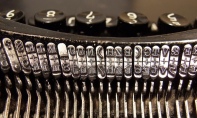 |
(July 2016) Cud Flashes In The Pan |
Would you want to live forever?
“Beam Me Back”
Science Fiction
By David M. Fitzpatrick
Vonda stood in the porting chamber as she watched the operator work the controls. She felt the wave of force surge through her as it scanned and mapped every atom in her body. Then the decoherer hit her with the beam that saturated her body and caused a quantum shift in every particle that made her Vonda. In a split second, every bit of matter was converted into quantum energy and then flung across the galaxy to the reception point. There, the receptor used the map data to reconstitute all that quantum energy into atoms that became the same person she was when she had left.

She blinked and sucked in a breath. It was a different porting chamber and a different operator. The feeling was always bizarre.
“Welcome to Tenarius,” the operator greeted her.
She’d traveled seven hundred light years.
* * *
Vonda had beamed around the galaxy many times, but she only remembered some of the trips. It was the easiest way to travel anywhere, and of course the mapping could be used to restore a person back to a previous version of herself. The last time she’d done it had been nine years ago—just the day before her life changed forever.
She sat in the lab as her remapping technician reviewed her request.
“So you understand that by converting your physical form into raw quantum energy and then reconstituting it, you will be the same physical person you were when you began?” he asked.
“I do.”
“But that we will be using an old map of you, not the one we’ll record when we begin the process?”
“Yes.”
“And that anything about you that has happened since that old map was created—memories, injuries, alterations, whatever—will be forever lost?”
She’d thought about this nonstop for the past week. It hurt to keep thinking about it, but she knew that the pain would soon be over. “Yes.”

He tapped something on his tablet, nodding sagely. “I see here that you’re about one hundred fifty years old, but your current body appears to be around thirty. You’ve remapped many times. How old is the map you’ve brought with you?”
“Nine years.” It was the longest she’d gone with remapping since she’d started doing it in her twenties. It was basic science: The human brain could only store so many memories, so from time to time the only way to clean it out was to revert back to a previous body map. A good inspiration to do it was when someone wanted to forget a few years.
“And have you made a full record of the last two years that you can review, in case there’s anything your remapped self will need to know?”
Vonda felt her reply stick in her throat. “Yes,” she finally said.
“Okay, then,” the tech said, smiling at her. “Let’s get you into the porting chamber and rewind you nine years.”
* * *
It was like any porting chamber, but Vonda knew she wasn’t going anywhere. The tech was at the controls.
“Preparing to initiate remapping,” he announced. “If you have any fond memories you’d like to relive one last time, you have about a minute to do so.”
She heard the machine whine, felt its power flow through her. For the past week, she’d fiercely tried to ignore the memories of the last nine years, but she suddenly found herself frantically trying to recall every moment that she was trying to forget forever.
She saw the day she met Trini on Quinquor 8, relived the feeling of shaking her soft hand. She remembered how taken she’d been with Trini’s alabaster skin and cascading red hair, her sparkling green eyes and her full-lipped smile. Vonda had asked her out that evening, and they’d danced and drunk together until the planet’s six fiery moons filled the night sky. Trini had kissed her under those moons, and then they’d spent the night making love, and Vonda knew that she’d found her soul mate.

She recalled their travels around the galaxy: their marriage on a ship within a rainbow nebula, swimming in the purple oceans of Gallador, riding winged dracobirds on Zavaeya, ringsurfing at Saturn, watching binary stars setting behind a green-yellow gas giant she never did know the name of. She remembered making love a thousand times around the galaxy, felt the love and the lust and the overpowering sense of togetherness with Trini, the oneness they created, the perfection of the life they shared.
And she remembered the sorrow of the time she’d had a drunken tryst with that exotic blue-skinned Kibian female, and how Trini had cried and Vonda had cried and how Trini had forgiven her. She remembered how she’d later laughed when Trini had spent the night with a man, and how these experiences had opened their relationship up to so much more. They’d sought happiness however the other wanted, making love with others across the galaxy and always coming home together, always in love.
But try as she might, Vonda couldn’t ignore the memories she wanted gone. Just last week, Trini was going to teleport home from a distant world, but she never arrived. Sometimes, they said, some cosmic anomaly interfered with the energy transmission. There were checks and balances, error correction, and a thousand ways to prevent the worst from happening, but the worst had happened anyway. Trini’s energy, all that made her who she was, had been lost.
When Trini died, Vonda knew that she couldn’t live without her, and with the memories of losing her. She either needed to die or to forget. She’d been certain of it every day since Trini’s death.
But as the whine of the chamber reached a crescendo, suddenly Vonda realized that her decision was wrong. She couldn’t allow herself to forget Trini. She couldn’t throw away the memory of their life together. No matter how much it hurt, she had to endure that for the incredible range of memories and experiences that made it all worth it.
This was a mistake. She knew that now. She waved her arms at the tech, tried to get his attention, but he was so focused on what he was doing that he never noticed—
* * *
Vonda blinked inside the chamber. She’d just been remapped, she knew. Was it just the day before going to Quinquor 8? She had an assignment there for work—a business meeting with one Trini Minadorn. She hated those meetings, but work was work. Who knew—maybe the woman would be a cute lesbian who was interested in a one-night fling.
“Welcome,” the tech at the control panel said. “You’ve just lost the last nine years in a remap. It’s September 2, 2842.”
Nine years! Vonda breathed in surprise. She wondered what had happened in that time.
* * *
In her room that evening, she watched a brief video she’d made for herself. There was a long segment covering her career, finances, property ownership, taxes, and so forth. But when it came to the persona stuff, it was quite brief.
“The last nine years ended the worst way possible,” she said. “There’s nothing worth remembering—nothing that won’t make you miserable, anyway.”
That was mostly it. Fleetingly, Vonda wondered what had happened to warrant the remapping. But she would certainly trust herself. From time to time, people would wipe out a few years, ten years, twenty years, whatever—all to be young again, and to free up space in the brain, which had a finite memory capacity. It was a simple matter of making detailed records of anything really important that needed to be known later.
In this case, Vonda realized, there had been nothing worth remembering.
She deleted the video and went on with her life.
“Absurd Immortality”
Science Fiction
By David M. Fitzpatrick
It was all Ethel could do to bear listening to George talking about it. Ever since he’d first read about it in that science magazine in the 1990s, he’d gone on and on about it. That was George: always eager for the next exciting science-y whatever. He’d been that way when they’d gotten their first television—a General Electric—in 1954, stayed up all night watching Walter Cronkite and the first moon landing in 1969, and brought home his first computer—a TRS-80—in 1984. Ethel always let him have his fun.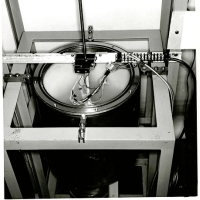
But when he became infatuated with cryonics after that magazine article, she’d put her foot down. George wanted to live forever—which was certainly not in line with God’s plan—by freezing himself after he died.
“It’s how we’ll live forever, Ethel,” he’d tell her, as excited as a little boy given a pile of money and told to enjoy himself at the toy store. “When we die, they’ll freeze us in liquid nitrogen, see. And when they find a cure for whatever killed us—even if it’s just old age—they thaw us out and fix us up. And they don’t even have to freeze our whole bodies—just our heads. By the time they can fix everything, all they’ll really need is our brains.”
It was always “us” and “our” to George, but Ethel she made it clear that she’d have no part of it.
“When it’s time to die, it’s time to die,” she said, stern and final. “We’re not supposed to live forever, and not reanimated like some Frankenstein monsters!”
George always laughed her off. And Ethel never really thought the old fool would actually do it. But one day he came home wearing a silver bracelet with a medical symbol on it. He was grinning ear to ear as he showed her.
“When I die, they’ll see this,” he said. “It has instructions to keep my head cold. The facility will come and get me and freeze my head.”
Ethel felt her jaw drop. “Tell me you didn’t, George Benton!”
“I have investments to pay for it,” he said, “and I’ll get to see the future.”
Then he reached in his pocket and pulled out another bracelet. He held it up to her like a young man proposing with a diamond.
“I bought two slots in the tank,” he said. “One for each of us. Just put it on, and we’ll be together in the future.”
Fear and anger washed over Ethel like a tidal wave of liquid nitrogen, and suddenly she struck his hand, sending the silver bracelet flying. She screamed about how crazy he was and that she didn’t want her head cut off and saved for later to be stored in a tank with other heads. He looked positively hurt, and when she quieted long enough, he said, “I’m sorry, Ethel. But I promised you in 1949 that I’d love you forever, and be with you forever. This way, we can do that.”
“We’re supposed to be together forever in Heaven,” she snapped.

He sighed then. “Ethel, you know I love you. And you know I agreed to that church wedding for your parents’ sake. But we’ve been married fifty-five years next month, and you know I’ve hardly ever gone to church with you. I’m more interested in the science of life, darling. If there’s immortality, you know I believe it’ll be found right here on Earth.”
And she cried and hurried off to her sewing room, where she sobbed and tried to knit a pair of booties for her great-granddaughter. She had to quit because the first one looked to her like a little frozen head.
* * *
George passed away just three months later. It was the week before Thanksgiving, and he went peacefully—sitting in his easy chair, where he had been watching a marathon of the 1960s Star Trek television show. She’d brought him a sandwich to find that he’d gone. She’d cried over him, begging him to come back to her, holding his hand and praying to God, but it was too late.
She looked down at the hand she held, at the silver bracelet he wore. She felt revulsion at it.
On the TV, the episode was one of George’s favorites. It was about a man who couldn’t die, who had lived for centuries. That repulsed her even more. She grabbed the remote and snapped it off, dried her eyes, and found the phone to call them to come take him away.
And after she hung up, she looked back to that bracelet again. It gleamed in the flickering light of the television. There was no way she’d let it happen. No way.
By the time the ambulance showed up, she’d removed the bracelet and stuffed it into her pocket.
* * *
George had a proper Christian funeral, with a beautiful casket and a marble headstone and a solemn burial, all the way he hadn’t wanted. But this would be for the best, she knew. He was put in the ground at a plot she’d purchased, with both of their names on the headstone. Her death date hadn’t been etched into the stone yet, but she figured she’d be along soon enough.
She hadn’t counted on the guilt of what she’d done in violating his last wish, absurd though it was. She kept the bracelet in her pocket after he’d passed, and every day she’d take it out and look at it. It had clear instructions on it: KEEP HEAD COLD, it said. Then it had emergency contact information for the company, Cryofuture; apparently, they would have come to get his body… and then cut off his head, of all things! She shuddered when she thought of it.
Her decision had been for the better. He could curse her out over it in the afterlife if he were still mad about it.
But, fleetingly, she wondered what would happen if there were no afterlife.
* * *
He’d been gone six months when she decided she couldn’t carry that tragic reminder with her any longer. She was in her sewing room, and she opened up her jewelry box where the two bracelets George had purchased were hidden away. She had to throw them out.
But just seeing them overwhelmed her. She had violated his final wish, and… and what if he’d been right? What if all that he had been had died that day, forever? What if there were no Heaven, and she had denied him his dream of everlasting life?
Fright overtook her and she began trembling. What had she done? Had she committed the most horrible of acts? Her weak old he
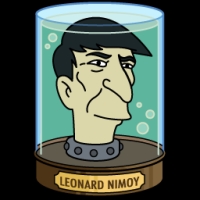
art pounded mercilessly in her brittle chest, and tears filled her eyes. She grew quickly dizzy from hyperventilation, as her chest ached…
And she felt the pounding in her chest cease, felt the pain rip through her body. She knew what it was, and at her age it was no surprise. She gasped and groped for the telephone on her sewing table and dialed 911. She could only whisper a plea for help, and she barely heard the dispatcher respond as the phone slipped from her hand and clattered to the floor.
Darkness closed in on her vision and the room began to spin. She saw the glint of the bracelets through her dimming eyes, and in that moment death terrified her. She grabbed for her bracelet, fumbled with it, slid it over her hand and onto her wrist.
Then she toppled out of her chair in an eternal fall into painless blackness
* * *
She came awake suddenly. Bright lights were in her eyes.
“Ethel Benton?” said the man above her. “Are you all right?”
She blinked and said, “Yes, quite all right. Thank you, doctor. Was it my heart?”
“That, thanks to your age,” he said.
She tried to sit up but couldn’t. “Am I paralyzed?”
“Not at all,” said the doctor. “We just haven’t activated the involuntary muscles on your new body yet.”
* * *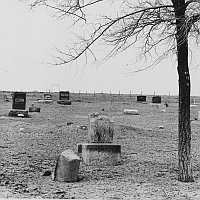
She stood over George’s grave. Her death date had been added when they’d buried her headless body.
The cracked and tilting headstone was in dreadful shape from three hundred years of deterioration. The overgrown cemetery wasn’t well tended, but few were these days. Beneath her, she knew, was George’s dusty corpse.
She cried, praying and talking to him, but knowing that he was gone forever.
“I’m so sorry, George,” she cried. “I’m so terribly sorry…!”
She finally left the overgrown cemetery—a young woman’s rejuvenated face on its android body—but knowing she’d have to return, frequently, to punish herself for what she’d done.
It would be a long immortality.
“Exceeded Capacity”
Science Fiction
By David M. Fitzpatrick
Janok and Phelia were walking in the public park, holding hands, when the flying transport crashed. Such things almost never happened, and when Janok heard the sudden whine and looked up at the red craft plummeting toward them, he could only think to tackle Phelia. And as he was pelted by a storm of dirt and rocks, he blacked out.
When he woke in the medcenter, he had a clear vision of the last few moments before the impact from his short-term-memory buffer. But he had big gaps in his memory; he knew because the central core buried in his brain told him so. Aside from the short-term buffer that gave him the basic sensory input of that last few moments before losing consciousness, he was missing the last eight years.
“I have amnesia,” he told the woman standing over him—a nurse, he supposed. She was beautiful.
“It’s okay,” she said. “As soon as they took you away from the park, I ran home to get a backup.” She held up her hand, and the tiny silver chip in her fingers gleamed in the hospital light.
“I know you,” he said, and he accessed the short-term buffer again. She was the woman in that brief buffer data, and he saw himself tackling her, trying to save her from the crashing transport.
She smiled down at him, clasped his hand in hers. It felt strange, maybe a bit alien, but Janok knew that she was important to him. She just didn’t feel important.
“I’m your mate, Janok,” she said. “My name is Phelia. We met four years ago. Your most recent memory chip was destroyed—a rock pierced your skull. It’s amazing you weren’t killed. But the doctor said it’s okay to install this. You’ll just lose everything since last night’s backup.”
Her hand was warm and he knew he should feel an emotional connection to her, but he didn’t. The moment felt incredibly awkward.
“I love you,” she said.
He didn’t know how to respond. He didn’t love her. He couldn’t love her. But if she were right, he would soon enough. And as if on cue a doctor entered the room.
“The good news is you’re all right, Janok,” the doctor said. “Aside from the damaged chip, there’s nothing wrong but cuts and bruises.”
“I remember everything from my life,” he said to the doctor. “It feels like eight years ago was yesterday. If it weren’t for my core alerting me to the lost years…”
“An unsettling feeling, I know. We’ll fix it soon enough.”
Janok watched the bizarre scene—the beautiful woman looking at him longingly, the doctor taking the tiny chip from her and running his fingers through Janok’s hair as he sought out an open port. Janok heard the mildest CLICK as the chip slid into the port, and just like that the memories flooded in. It was confusing and chaotic at first, with images and memories flooding through him like a rushing tidal wave. None of it made sense, because it was just raw data being force-fed into his conscious brain, without the emotional experiences attached, but suddenly Janok’s world went dark as his core rebooted. He felt himself blink in the blackness, saw the report of the reboot in his vision.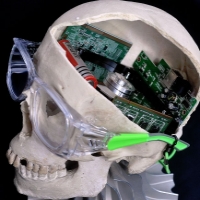
And when his visual cortex began working again, those eight years of love and dedication exploded back into his brain. He cried out to his beloved Phelia, who cried back and collapsed into his arms, and they hugged and kissed.
“How could I not know you?” he said. “How could I forget the love I had for you?”
“It’s all over,” she said, sobbing.
“It’s the price we pay for our lifespans,” the doctor said. “The human brain can only remember so much. Thanks to cybernetic advancements, we can store memories forever. It’s why you’ve lived over three thousand years, Janok. So you can go home today—but just keep doing those backups.”
* * *
Janok and Phelia talked about the event often. They’d both had many relationships over the centuries, but when they’d met four years before, they soon became forever mates. Having lost her for that short time was a terror that stayed with Janok, invaded his dreams, made him insecure about losing her. She always reassured him that he never would, because they backed up every night.
“The backups here in our home, and the copies off-world, will ensure that we’re always together,” she said.
“Knowing it doesn’t make it easier to deal with the fear,” he said.
* * *
They spent the next century in wedded bliss, and then it happened again—the worst of accidents, the kind that virtually never occurred, and hadn’t for longer than anyone could remember. They were on another walk on a hiking trail when a boulder above them, unnoticed by the area safety systems, gave way and crushed Phelia’s skull. She was dead right there on the trail, but Janok wasn’t too concerned. He called for help, and within a minute the med transport picked her up and rushed her body to the med center, where they’d repair the damage, rebuild her damaged brain, and restore her backups to make her whole again.
He sat in the waiting room, patient but nervous. People died and were resurrected and regenerated from time to time, but seeing her skull split open, her brain visible, the gleaming chips jutting out of her bone—it was all quite unnerving.
Presently, the doctor who was tending her came out to meet him. She looked stern and serious and troubled.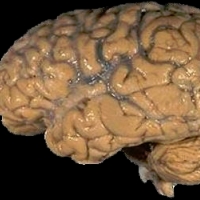
“Is she awake?” Janok asked.
“I’m afraid it’s worse than that, Janok,” the woman said. “There are many parts to the brain, and we can regenerate them all, but the parts responsible for personality and consciousness… they were damaged in Phelia. Very badly.”
“So it will take longer to fix her?”
“No… she cannot be fixed. We can regenerate the damaged brain, but the person she is will be gone forever.”
“But I have her complete life backups!”
“And she will have access to those memories, and even the emotions attached to them,” she said, “but her sentient mind will be a different person.”
Janok felt unsteady on his feet. “But we’ve been together a hundred years. We’re the perfect pair, doctor. She’ll still be my mate. She has to be.”
* * *
Janok brought Phelia’s entire lifetime of backups from home and the doctors carefully fixed all her implants even as they fixed her head. It took a day, but when she was stable and repaired, they let him see her.
She was in the bed, her head bandaged, and at first he thought her face lit up when she saw him, but he realized that she was just reacting in recognition. He approached the bed, looking at her with longing eyes, hoping to see longing in hers.
“Hello… Janok,” she said.
“Hello, Phelia.”
She squinted, deep in thought. “I have so many memories of you. A century of them. But it’s very strange… like knowing someone from watching a fiction show and finally meeting that person. Sort of… real but fake.”
“Tell me you love me,” he whispered.
She looked at him with mournful eyes. “My memories tell me that I should. I feel the love she had for you. But…”
“SHE had?” Janok echoed. “You’re the same person. You’re the one who had that love.”
She looked helpless. “I’m sorry… I’m reviewing all these memories and it’s all wonderful, but… like characters and scenes from stories.”
He felt tears welling in his eyes, felt his knees shaking. “But you’re the only one who mattered to me. I can’t go on without you. Please, be with me.” And tears streamed down his face.
“What will it be like, Janok?” she said, clearly touched by his tears, but not crying any of her own. “You, with all the emotional attachment to me from a hundred years, and me starting out anew. It would feel wrong to me, imbalanced and lopsided.”
As the tears streamed down his cheeks and he trembled where he stood, longing to touch her but knowing that she didn’t want to be touched, a moment of clarity flashed through his mind. He left to find the doctor.
* * *
Blackness. Rebooting.
The boot message appeared in his visual cortex. Light suddenly flowed into his eyes, even as his memories came online. He felt the surge of visions, sounds, smells, tactile senses, and emotions as three millennia flipped through his mind like pages in a massive tome.
He was Janok. He was reliving all those centuries of memories. They were wondrous, but it was like someone else’s story. He could feel the man Janok had been, and knew the man he was now. They were different.
The most recent memories were backed up just before his procedure that morning. He watched them, watched the conversation with the doctor. Watched Janok ask to have his brain destroyed and regenerated, so that he would be a new man with a new personality and a new mind. And all for what?
For… a woman? Phelia? So that he’d relive someone else’s memories, but start over at the beginning—just like her.
He couldn’t imagine being that much in love with a woman, even though Janok’s memories showed him the depth of that love. It didn’t matter; he was who he was now, no matter who he had been.
And then he realized she was in the room. He looked over at her, standing in the doorway, and she was so beautiful. And the familiarity he had for her, from a hundred years of love and togetherness, impacted him on many emotional levels—but, still, like a fiction show.
“Hello, Janok,” she said in a soft and, maybe hopeful voice.
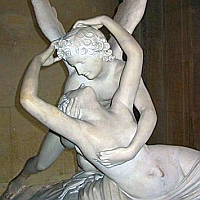
“Hello, Phelia,” he replied.
“I have been reliving her memories,” she said, “and the more I do, the more beautiful their love is to me. But…” And she trailed off.
“But it isn’t your love,” he said. “I feel the same. But I know that if Janok hadn’t done this thing, he would have been so miserable.”
“It’s like they’re dead,” she said, moving into the room and to his bedside. “Two people in love, and we know all about them, but they’re dead and gone.”
It was exactly like that, and the idea humbled Janok.
“I don’t know whether it will work, but I think we owe it to their memories to see where this leads,” Phelia said. “We could get to know each other, and find out who these people used to be.”
She took his hand, and it was a wonderful feeling. He looked up at her, returning her smile.
“And perhaps who they will be again,” he said.
In that instant, the new memories Janok was forming were as overpowering as the century of memories he had of her, and right then there was nothing else at all that mattered.
David M. Fitzpatrick is a fiction writer in Maine, USA. His many short stories have appeared in print magazines and anthologies around the world. He writes for a newspaper, writes fiction, edits anthologies, and teaches creative writing. Visit him at www.fitz42.net/writer to learn more.
